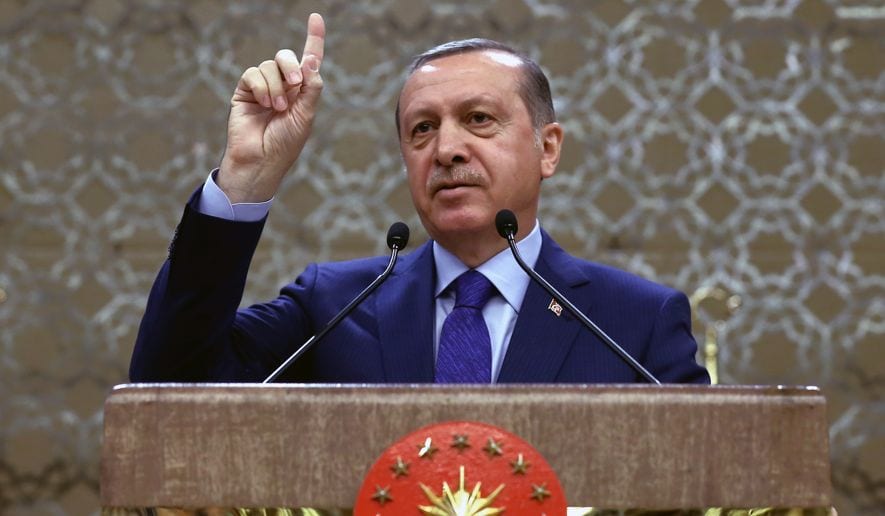The march of authoritarianism around the world has had different names over the past decade: “Neo-Ottomanism,” “Putinism,” “the Beijing Consensus.” The shared premise has been that fragile democratic systems were no match for strong rulers who can impose top-down solutions.
This idea of the efficient despot got a sharp rebuff Sunday in Turkey’s parliamentary elections. In a turnout of over 86 percent, voters denied President Recep Tayyip Erdogan the majority he needed to rewrite the constitution and give himself more executive authority. The result affirmed the stabilizing power of democracy and the wisdom of an informed electorate.
Turkish commentators were jubilant. “Pax Erdogan is over,” Ozgur Unluhisarcikli, the German Marshall Fund’s representative in Ankara, told The New York Times, adding, “Turkey has proved to be a self-correcting democracy.” Bulent Aliriza of the Center for Strategic and International Studies likened the election to “a nuclear explosion in Turkish politics.”
Why did Turkish voters reject authoritarianism at a time when its appeal still seems strong in other places? The answer surely begins with the relative strength of political institutions in Turkey. Secular democracy is nearly a century-old there: It has survived hot wars, cold wars, military coups and religious extremists. Turks know they have something to lose if their system is hijacked.
Turkey also has a civic culture that can support democratic institutions. It has a vibrant free-market economy, a free press, a strong military and an independent legal system. These were the very parts of Turkish society that Erdogan was seen as trying to intimidate or repress in his bid for greater power. Journalists, generals and judges couldn’t fight back effectively on their own; but voters together could do so.
Erdogan himself, ironically, helped encourage the Kurdish activism that was a potent factor in Sunday’s elections. As leader of the Justice and Development Party, or AK Party, he has courted Kurdish votes by offering greater rights – and even by making peace, for a time, with the extremist group known as the Kurdistan Workers’ Party, or PKK.
But Sunday, the vehicle for Kurdish self-expression turned out to be the liberal People’s Democratic Party, or HDP, headed by the charismatic Selahattin Demirtas. It won more than 13 percent to become the first explicitly Kurdish-oriented parliamentary party in Turkey’s history. This embrace of pluralism in Turkish life may be as important as the rejection of Erdogan’s executive-power grab.
The Turkish election has global importance because it challenges what had seemed, until recently, the inexorable rise of nationalist strongmen and authoritarian parties. Proponents of the so-called Beijing Consensus argued that the great advantage of the Chinese model was that it worked; centralized state power could achieve results that were impossible in more chaotic, bottom-up democracies. These anti-democrats were buoyed (and critics were deflated) by the success of China’s President Xi Jinping, who styles himself these days as “Xi Dada,” or “Big Daddy Xi.”
Russian’s Vladimir Putin is another avatar of modern authoritarianism. What’s disturbing about Putin is that his corrupt, belligerent regime is extremely popular with the Russian people. A Russian polling firm called the Levada Center reported recently that his popularity stands at 86 percent, despite sanctions, a declining economy and suppression of dissent. President Barack Obama’s approval rating, by contrast, currently stands at about 45 percent. The qualities of reason and restraint that arguably help define Obama as a democratic leader are taken, in his case, as signs of weakness.
Putin seems to answer a popular Russian yearning for greatness and empire. But similar words were used just a few months ago to describe Erdogan’s appeal as a “neo-Ottoman,” a Turkish leader with the power (and palaces) of a sultan. Even as popular resistance began to surface in the Gezi Park protests in 2013, Erdogan pressed ahead. It wasn’t obvious that he had overreached until Sunday.
Fareed Zakaria has written over the past decade about the rise of what he calls “illiberal democracy” – the growing power of leaders such as Erdogan, Xi and Putin who govern with a veneer of popular legitimacy but a core of state control. You could add Egypt’s popularly elected strongman, President Abdel-Fattah al-Sisi, to that list.
Americans are too quick to define democracy in terms of elections. What produced Sunday’s genuinely democratic outcome in Turkey was something deeper than the fact that large numbers of people went to the polls. Erdogan failed to get his mandate because he challenged a culture of checks and balances, and the institutions that give Turkish democracy its resilience.
David Ignatius is published twice weekly by THE DAILY STAR.


Leave a Reply